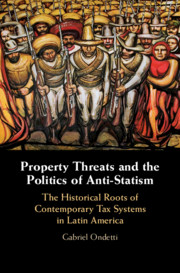 Property Threats and the Politics of Anti-Statism
Property Threats and the Politics of Anti-Statism Book contents
- Property Threats and the Politics of Anti-Statism
- Property Threats and the Politics of Anti-Statism
- Copyright page
- Dedication
- Contents
- Figures
- Tables
- Preface and Acknowledgments
- 1 Introduction
- 2 Historical Property Threats and Contemporary Tax Burdens
- 3 Chile
- 4 Mexico
- 5 Brazil
- 6 Argentina
- 7 Conclusions
- Appendix: Interviews
- References
- Index
6 - Argentina
Populism, Divided Elites, and Heavy Taxation
Published online by Cambridge University Press: 14 January 2021
- Property Threats and the Politics of Anti-Statism
- Property Threats and the Politics of Anti-Statism
- Copyright page
- Dedication
- Contents
- Figures
- Tables
- Preface and Acknowledgments
- 1 Introduction
- 2 Historical Property Threats and Contemporary Tax Burdens
- 3 Chile
- 4 Mexico
- 5 Brazil
- 6 Argentina
- 7 Conclusions
- Appendix: Interviews
- References
- Index
Summary
Although the trajectory of Argentina’s tax burden has been more volatile than Brazil’s, today the countries share a similar level of taxation. This similarity reflects the fact that neither has experienced threats to private property profound enough to spur the rise of a powerful anti-statist bloc. The most significant redistributive reform wave in Argentine history occurred under Juan Perón (1946-1955), who mobilized workers and expanded the welfare state. However, like Getúlio Vargas, Perón spared private property and opposed socialism. As a result, he failed to provoke the formation of an anti-statist bloc capable of acting as an enduring constraint on public sector growth. Instead, he aggravated private sector divisions, strengthened labor and forged a broad populist electoral coalition. For decades, military intervention kept statists from wielding power in a sustained fashion. In addition, hyperinflation and the global ascendancy of neoliberalism pushed even a peronista president to adopt neoliberal reforms in the 1990s. Gradually, however, these constraints have fallen away, and the superiority of statist forces has come to be reflected in heavy taxation and social spending.
Keywords
- Type
- Chapter
- Information
- Property Threats and the Politics of Anti-StatismThe Historical Roots of Contemporary Tax Systems in Latin America, pp. 191 - 233Publisher: Cambridge University PressPrint publication year: 2021
